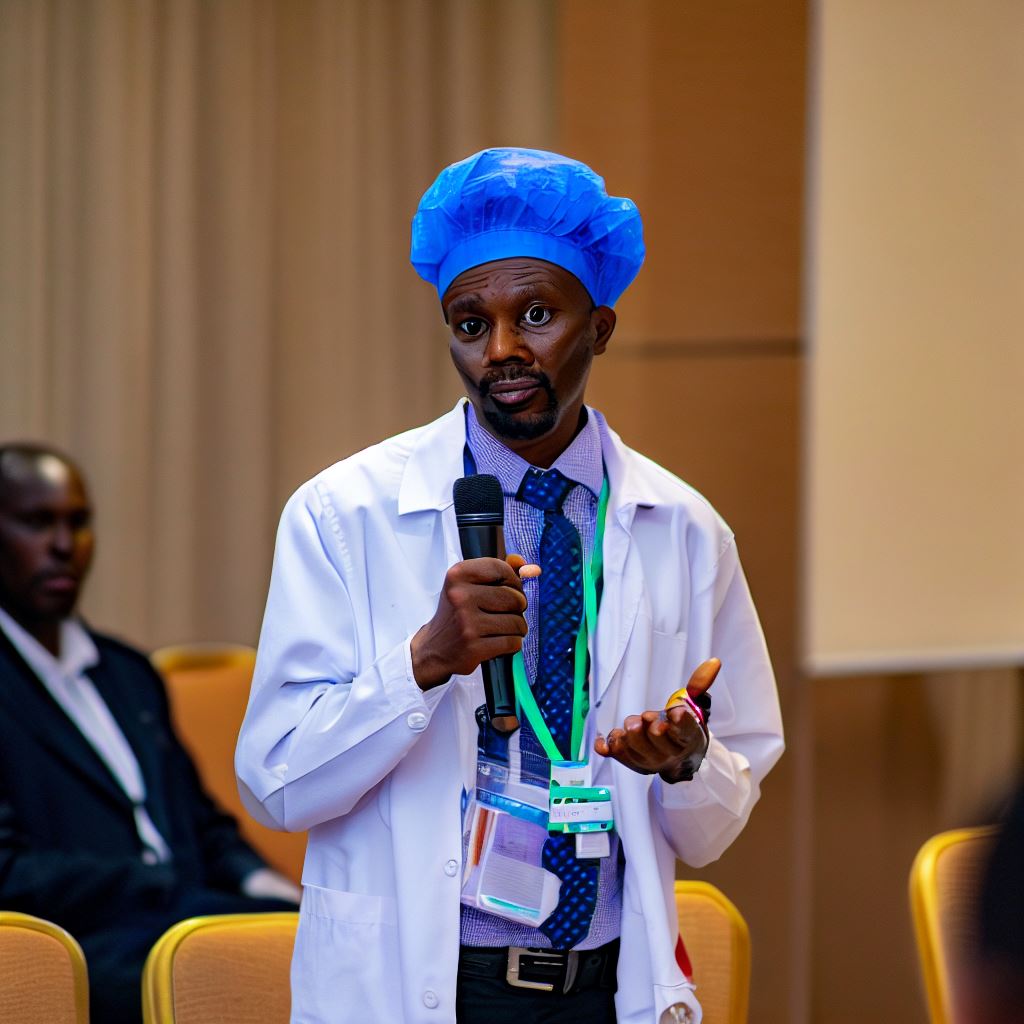Introduction
Epidemiology plays a crucial role in Nigeria, addressing public health challenges and promoting well-being.
This blog will recount my personal journey from being a student to becoming an epidemiologist.
This post will delve into the difficulties, encounters, and advantages of transitioning to an epidemiologist in Nigeria.
Importance of Epidemiology in Nigeria
Epidemiology is vital in Nigeria, helping combat diseases, inform policies, and improve public health outcomes.
- Disease Control: It aids in the prevention, monitoring, and control of diseases like malaria and COVID-19.
- Policy Guidance: Epidemiological data shapes health policies, ensuring efficient resource allocation.
- Health Equity: Epidemiology addresses health disparities, striving for equal access to quality healthcare.
Personal Career Journey from Student to Epidemiologist
My journey from an eager student to a seasoned epidemiologist has been a fulfilling adventure.
- Educational Foundation: I began with a passion for public health and epidemiology.
- Fieldwork and Research: Hands-on experience honed my skills in data collection and analysis.
- Challenges Faced: Overcoming obstacles in data gathering and community engagement was part of the journey.
- Impactful Work: My role in disease surveillance and research has contributed to healthier communities.
Thesis Statement
This blog post will explore the challenges, experiences, and rewards of transitioning from a student to an epidemiologist in Nigeria.
- Challenges Faced: Discover the obstacles encountered during training and early career stages.
- Experiences Gained: Explore the valuable experiences in the field and research.
- Rewards of the Journey: Learn how this career positively impacts public health in Nigeria.
Stay tuned as we delve deeper into my personal career journey, shedding light on the exciting world of epidemiology in Nigeria.
Background on the Field of Epidemiology
Definition and Purpose of Epidemiology
Epidemiology is the study of how diseases spread, their distribution, and determinants of health.
It aims to identify patterns, causes, and influencing factors of diseases in populations.
Role of Epidemiologists in Public Health
Epidemiologists play a crucial role in public health by investigating and preventing the spread of diseases.
They collect and analyze data, identify risk factors, and develop strategies to control and mitigate health threats.
Significance of Epidemiology in Addressing Health Issues in Nigeria
Epidemiology is critical in addressing health issues in Nigeria due to its large population and diverse health challenges.
It helps in understanding disease burden, identifying high-risk populations, and assessing healthcare interventions.
Moreover, it aids in monitoring the effectiveness of public health programs and policies.
Epidemiology enables the early detection and response to disease outbreaks in Nigeria.
It helps in understanding the determinants of health and social factors influencing disease transmission.
By studying patterns of diseases, epidemiologists can contribute to evidence-based policymaking.
They collaborate with healthcare agencies and policymakers to develop strategies for disease prevention and control.
Epidemiology plays a vital role in tracking and managing infectious diseases, including HIV/AIDS, malaria, and Ebola.
It provides a scientific foundation for public health decision-making and resource allocation.
By examining disease trends, epidemiologists can identify emerging health threats and take proactive measures.
Epidemiological studies help identify risk factors and guide the development of preventive measures and interventions.
Through research, epidemiologists can evaluate the effectiveness of healthcare programs and interventions.
Epidemiology also enhances surveillance systems and helps improve health data collection and reporting.
Epidemiology is a crucial field that contributes significantly to public health in Nigeria.
Epidemiologists play a vital role in understanding disease patterns, identifying risk factors, and developing strategies for disease prevention and control.
Their work helps safeguard the health of the population and informs policymakers to make evidence-based decisions.
The importance of epidemiology in addressing health issues in Nigeria cannot be overstated, as it plays a central role in achieving better health outcomes and reducing disease burden.
Read: Funding Opportunities for Scientists in Nigeria
Educational Pathway
Academic Requirements and Qualifications to Become an Epidemiologist
- To become an epidemiologist in Nigeria, one must obtain a Bachelor’s degree in a related field such as public health, biology, or medical science.
- Graduate level education, such as a Master’s or PhD degree in epidemiology or a related field, is highly recommended for advanced positions.
- Acquiring certifications, such as the Certified in Public Health (CPH) credential, can enhance one’s credibility and job prospects in this field.
- Strong analytical and statistical skills are essential, as epidemiologists need to collect, analyze, and interpret data to identify patterns and trends.
- Proficiency in computer software, especially for data analysis and modeling, is also necessary for epidemiologists to perform their job effectively.
- Excellent communication skills, both written and verbal, are vital to present research findings, collaborate with colleagues, and communicate with the general public.
Personal Experiences During the Academic Journey
- During my undergraduate years, I was exposed to various foundational courses in public health, biology, and statistics.
- Attending seminars, workshops, and conferences related to epidemiology helped me gain insights from experts in the field.
- Internships and practical experiences at healthcare institutions allowed me to apply theoretical knowledge in real-world scenarios.
- I actively participated in research projects and worked closely with experienced epidemiologists, learning valuable skills and techniques.
- Collaborating with fellow students on group projects fostered teamwork and provided opportunities for peer learning.
- Engaging with professors and seeking their guidance helped me navigate through challenging academic aspects.
Challenges Faced and How They Were Overcome
- One of the major challenges was the lack of resources and facilities in my university, which affected practical training.
To overcome this, I sought additional learning opportunities outside the curriculum. - Time management was another hurdle, juggling coursework, research projects, and extracurricular activities.
Developing effective time management skills and prioritizing tasks helped me stay organized. - The fast-paced nature of the courses often made it challenging to keep up with the vast amount of information.
Taking concise notes and reviewing them regularly assisted in retaining knowledge. - The language barrier occasionally posed difficulties, especially when studying scientific literature in English.
Active engagement in English language courses and constant practice improved my language skills over time. - Financial constraints sometimes limited access to relevant academic resources and research materials. I sought scholarships, grants, and utilized online resources to overcome this hurdle.
- Receiving constructive feedback on assignments and research work helped identify areas of improvement, allowing me to grow academically and professionally.
With determination, perseverance, and continuous learning, I managed to overcome these challenges and progress in my journey to become an epidemiologist in Nigeria.
The academic pathway provided a solid foundation, and personal experiences enriched my knowledge and skills, preparing me for the challenges that lay ahead.
Read: The Demand for Hydrologists in Nigeria: A Comprehensive Study
Internship and Practical Experience
Importance of Gaining Practical Experience in Epidemiology
- Practical experience is crucial in epidemiology as it bridges the gap between theory and real-world application.
- It allows students to apply their knowledge to different situations and understand the complexities of public health.
- With practical experience, epidemiologists can develop essential skills like data collection, analysis, and interpretation.
- It provides an opportunity to work with mentors and professionals in the field, gaining valuable insights and guidance.
- Internships help students understand the challenges and limitations of implementing epidemiological studies in resource-limited settings.
- Practical experience enhances critical thinking abilities, problem-solving skills, and the ability to communicate effectively in the field.
- It establishes a foundation for future research and career opportunities, providing a competitive edge in the job market.
- Gaining practical experience in epidemiology prepares students for the dynamic nature of public health emergencies.
- It fosters collaboration and teamwork, as epidemiologists often work closely with other healthcare professionals.
- Overall, practical experience equips students with the necessary skills to contribute effectively to public health interventions.
Personal Experiences During Internships
- During my internship, I had the opportunity to work on a tuberculosis surveillance project in rural Nigeria.
- I conducted field surveys, collected data from healthcare facilities, and analyzed the information to identify trends.
- One memorable experience was participating in a measles outbreak investigation, where I learned the importance of rapid response.
- I also assisted in designing and implementing health education campaigns to raise awareness about infectious diseases.
- Internships exposed me to the realities of public health challenges and the need for evidence-based decision-making.
- Working with a team of epidemiologists allowed me to witness the power of collaboration and multidisciplinary approaches.
- These experiences strengthened my passion for epidemiology and motivated me to pursue a career in the field.
- I faced challenges, such as limited resources and logistical constraints, but these experiences taught me resilience and adaptability.
- Internships also provided networking opportunities, connecting me with professionals who shared invaluable career advice.
- The hands-on nature of my internships allowed me to see the direct impact of epidemiological research on community health.
Skills and Knowledge Acquired During this Period
- Internships provided hands-on training in data collection, including the use of different epidemiological research methods.
- I gained proficiency in statistical analysis software, further developing my quantitative skills.
- Working with large datasets enhanced my data management and data cleaning abilities.
- I honed my skills in critical appraisal of scientific literature to ensure evidence-based decision-making.
- I acquired knowledge about disease surveillance systems, outbreak investigation protocols, and public health interventions.
- Internships provided opportunities to develop leadership skills by coordinating and supervising field activities.
- I learned to effectively communicate epidemiological findings to diverse audiences, including policymakers and the public.
- I gained a deeper understanding of ethical considerations in epidemiological research, ensuring the protection of participants’ rights.
- The practical experience allowed me to apply epidemiological principles to real-world challenges and develop creative solutions.
- Internships also exposed me to the importance of cultural competency and community engagement in public health interventions.
Remember that the skills and knowledge you acquire during your internship can vary widely depending on your role, industry, and the specific tasks you’re assigned.
Read: Nigeria’s Hydrology Industry: Opportunities and Challenges

Challenges Faced as an Epidemiologist in Nigeria
Unique Challenges of Working in the Field in Nigeria
- Nigeria’s vast population poses a significant challenge in terms of data collection and surveillance.
- Fast urbanization, overcrowding, and poverty contribute to the rapid spread of diseases.
- Limited access to remote and rural areas makes it difficult to identify and track diseases effectively.
- Poor healthcare infrastructure hinders the timely delivery of healthcare services and interventions.
- Inadequate communication and coordination between various health sectors impede the implementation of epidemiological strategies.
Lack of Resources, Funding, and Infrastructure
- Nigeria faces a chronic shortage of essential resources like diagnostic tools and laboratory equipment.
- Inadequate funding for research, surveillance, and response activities hamper epidemiologists’ efforts.
- Poorly maintained and inadequate healthcare facilities limit the effectiveness of disease control measures.
- Limited access to clean water, sanitation, and hygiene exacerbate the risk of infectious diseases.
- Inadequate electricity supply poses challenges for preserving laboratory samples and conducting research.
Impact of Cultural and Societal Factors on Epidemiological Work
- Superstitions and misconceptions about diseases can undermine efforts to control outbreaks and promote preventive measures.
- Deep-rooted cultural practices, like open defecation and unsafe burials, contribute to the spread of infections.
- Social stigmas associated with certain diseases can lead to underreporting and delayed treatment seeking.
- Religious beliefs may influence health-seeking behaviors, acceptance of vaccinations, and compliance with public health interventions.
- Low health literacy levels and language barriers make it challenging to effectively communicate public health messages.
As an epidemiologist in Nigeria, I confront numerous challenges that hinder my work in disease control and prevention.
Nigeria’s unique context, characterized by a vast population, fast urbanization, and limited access to remote areas, makes it particularly challenging to collect accurate data and effectively track diseases.
The lack of resources, funding, and infrastructure further compounds these difficulties.
One of the major hurdles I face is the scarcity of essential resources required for diagnosing and monitoring diseases.
Diagnostic tools and laboratory equipment are often in short supply, hampering our ability to conduct comprehensive surveillance.
Additionally, the inadequate funding allocated for research, surveillance, and response activities severely limits our capacity to control outbreaks and implement effective interventions.
Read: Hydrologist Salary and Benefits: A Look at Nigeria’s Scene
Overcoming Challenges and Achieving Success
Strategies Employed to Overcome Challenges
- Embracing a positive mindset and refusing to let obstacles hinder progress.
- Developing a strong support network of mentors and colleagues in the field.
- Continuous learning and staying updated with the latest advancements in epidemiology.
- Fostering resilience and adaptability to navigate through unforeseen circumstances.
- Seeking out opportunities for professional development and skill enhancement.
- Utilizing effective time management techniques to maximize productivity and efficiency.
- Networking and collaborating with other public health professionals to share knowledge and resources.
- Advocating for adequate funding and resources to address public health challenges in Nigeria.
- Building strong relationships with policymakers and stakeholders to influence policy decisions.
- Engaging in advocacy campaigns to raise awareness about public health issues and promote positive change.
Personal Achievements and Successes as an Epidemiologist
- Contributing to the development of effective strategies to control infectious disease outbreaks in Nigeria.
- Leading research projects that have resulted in important findings to improve public health.
- Publishing research papers in reputable journals and presenting at international conferences.
- Mentoring and inspiring the next generation of epidemiologists in Nigeria.
- Being recognized and awarded for outstanding contributions to public health in Nigeria.
- Collaborating with international organizations to strengthen public health systems in Nigeria.
- Contributing to policy development and implementation to address public health challenges.
- Participating in interdisciplinary teams to tackle complex public health issues.
- Promoting evidence-based practices and interventions to improve population health outcomes.
- Building partnerships with local communities to implement effective public health programs.
Impact on Public Health in Nigeria
- Improved surveillance systems to detect and respond to disease outbreaks promptly.
- Reduced burden of communicable diseases through effective prevention and control measures.
- Enhanced understanding of the epidemiology of diseases prevalent in Nigeria.
- Influenced policy decisions to prioritize public health and allocate resources accordingly.
- Increased awareness and education on public health issues among the population.
- Strengthened healthcare systems and improved access to quality healthcare services.
- Promoted equity in healthcare by addressing health disparities among different population groups.
- Contributed to the development of evidence-based guidelines for disease prevention and management.
- Implemented interventions to reduce risk factors and promote healthy behaviors in communities.
- Improved overall health outcomes and quality of life for the Nigerian population.
Conclusion
In summary, the journey from student to epidemiologist in Nigeria has been challenging but rewarding
Epidemiology plays a crucial role in addressing health issues and improving the well-being of the country.
To aspiring epidemiologists, I encourage you to pursue your dreams, despite the challenges you may face.
Personal Journey from Student to Epidemiologist
- Starting as a student with a passion for public health and epidemiology.
- Gaining practical experience through fieldwork and research.
- Overcoming challenges in data collection and community engagement.
- Contributing to disease surveillance and research for healthier communities.
The Vital Role of Epidemiology in Nigeria
- Epidemiology is essential for disease prevention, monitoring, and control in Nigeria.
- It guides health policies and ensures efficient resource allocation.
- Epidemiology addresses health disparities, striving for equitable healthcare access.
Pursuing Your Dreams in Epidemiology
- Encouragement for aspiring epidemiologists: Embrace challenges as learning opportunities.
- Stay committed to making a positive impact on public health in Nigeria.
- Your journey from student to epidemiologist can contribute significantly to the well-being of our nation.
In your pursuit of a career in epidemiology, remember that your efforts can help create a healthier Nigeria for all.




